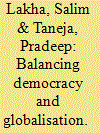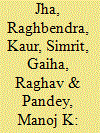|
|
|
Sort Order |
|
|
|
Items / Page
|
|
|
|
|
|
|
| Srl | Item |
| 1 |
ID:
092211


|
|
|
|
|
| Publication |
2009.
|
| Summary/Abstract |
Contemporary globalisation is viewed both as offering immense opportunities and posing a fundamental threat to the nation-state and democratic governance. To the proponents of globalisation, integration into the world economy through liberalisation of foreign trade and capital flows, combined with deregulation of the national economy, promises greater economic efficiency, higher consumption levels and generally improved living standards. For them, state intervention in the economy aimed at restricting the free play of market forces is dysfunctional, resulting in lower social and economic benefits for the population at large. Within this optimistic perspective, globalisation is thought likely to 'flatten' economic differences between nations1 and lead to a 'borderless world',2 where the barriers to flows of capital, technology, and information will be minimised if not totally removed.
|
|
|
|
|
|
|
|
|
|
|
|
|
|
|
|
| 2 |
ID:
131244


|
|
|
|
|
| Publication |
2014.
|
| Summary/Abstract |
The workfare scheme, the National Rural Employment Guarantee Scheme (NREGS), and the direct food subsidy programme, the Targeted Public Distribution Scheme (TPDS), represent two social safety nets instituted in India as anti-poverty measures. This paper examines whether from the point of view of individual households the two programmes are substitutes or complements, as this will shed light on the appropriateness of the design of the two programmes. Based on primary household data collected for the Indian states of Rajasthan and Madhya Pradesh (MP), we show that, in Rajasthan, a large percentage of households consider TPDS and NREGS programmes to be substitutes for each other, while in MP the households often perceive the two programmes as complements. Thus it appears that the two programmes are better designed in MP since an incentive for participation in one programme has desirable side effects on participation in the other. Correlates of participation in the two states are identified and the paper advances several policy conclusions.
|
|
|
|
|
|
|
|
|
|
|
|
|
|
|
|
|
|
|
|
|